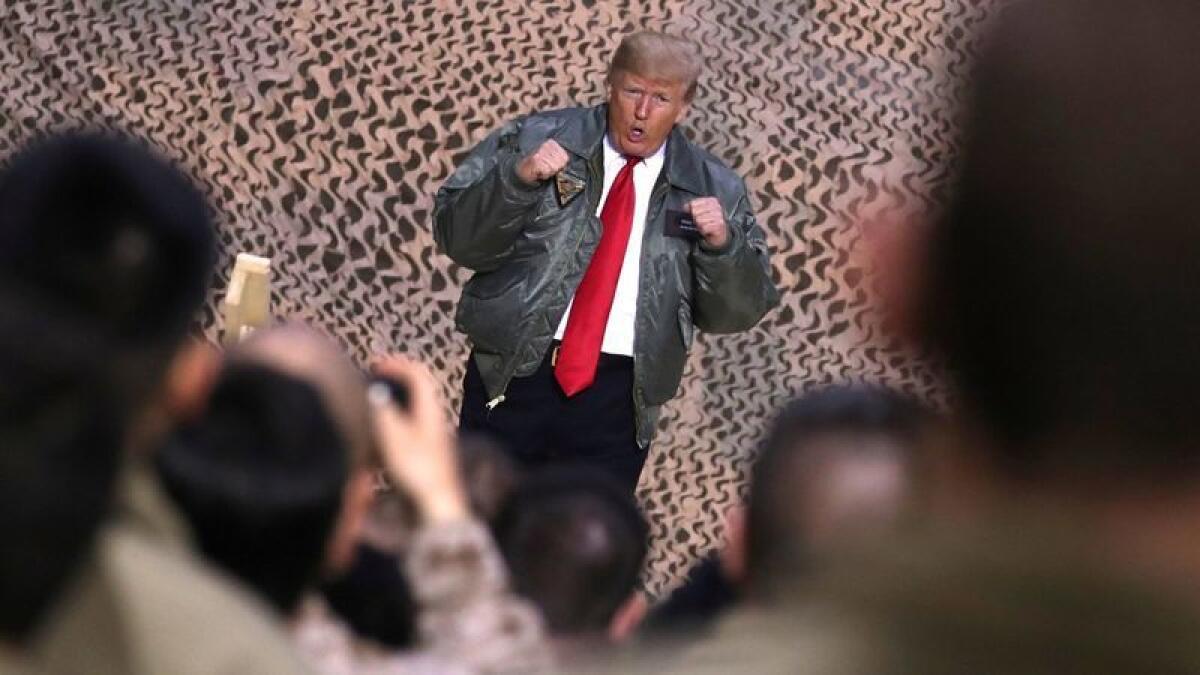Editorial: Engaging with the world doesn’t make Americans ‘suckers’

President Trump’s impulsive announcement that he would be withdrawing 2,000 U.S. troops from Syria led to a bipartisan chorus of criticism and the resignation of Secretary of Defense James N. Mattis. But it also prompted a defense of the president from within and outside the administration centered on the fact that the pullout was consistent with Trump’s longtime aversion to indefinite deployment of U.S. troops in what he sees as regional conflicts.
Trump has, in fact, made that aversion clear. Nor is he alone in his unease about open-ended military commitments. For example, when Sen. Bernie Sanders was seeking the Democratic nomination for president in 2016, he told the Los Angeles Times editorial board that he would “definitely attempt” as president “to make sure we do not get sucked into perpetual warfare in the Middle East.” Many Americans who would recoil at the crudity of Trump’s rhetoric about “America First” still share his frustration about the lack of progress in Afghanistan 17 years after U.S. forces were first deployed there.
The problem is that Trump is more than a skeptic about long-term military commitments. The president also has made it clear that he is unenthusiastic about America’s historic alliances, distrustful of international organizations and indifferent to whether other nations adhere to democratic ideals. Underlying all of these attitudes is a seeming contempt for the world outside America’s shores and a suspicion that other nations are perpetually taking advantage of the United States. In a September speech to the United Nations — another organization he dismisses — Trump said: “We reject the ideology of globalism, and we embrace the doctrine of patriotism.”
In remarks during his visit to the troops in Iraq last week, Trump suggested that his planned withdrawal from Syria showed that “we’re no longer the suckers, folks.” He complained to reporters: “We are spread out all over the world. We are in countries most people haven’t even heard about. Frankly, it’s ridiculous.” This is more than opposition to prolonged military intervention; it amounts to disdain for all sorts of engagement with other countries, including those with shared values. The U.S. is hardly a sucker for joining an international effort to defeat a threat, and ascertaining whether or not most Americans have heard of a country would be a scary way to determine whether the U.S. should get involved there.
In his resignation letter, Mattis wrote: “While the U.S. remains the indispensable nation in the free world, we cannot protect our interests or serve that role effectively without maintaining strong alliances and showing respect to those allies.” This was in part a reference to the partners in the U.S. campaign against Islamic State who were blindsided by Trump’s withdrawal announcement. But it should also be read as a reference to Trump’s grudging support for NATO and constant carping about how other members of the alliance aren’t paying their way.
Trump has tried to soften the blow of his Syria announcement, promising that the departure will be “orderly” and that U.S. special forces stationed in Iraq could launch raids into Syria if necessary to deal with remnants of Islamic State. Still, the withdrawal from Syria will go forward, and Trump reportedly is planning to withdraw half of the 14,000 remaining U.S. troops in Afghanistan. Almost halfway through his presidency, Trump seems determined to rededicate himself to the “America First” policy he announced in his campaign and shake off advisors who might disagree.
Enter the Fray: First takes on the news of the minute from L.A. Times Opinion »
This poses a challenge to his critics in Congress, including Democrats who will assume control of the House of Representatives next month and senators of both parties who will be asked to vote for a new secretary of Defense and other officials responsible for foreign and national security policy. Congress needs to focus not only on how amateurishly Trump executes foreign policy but the clear shortcomings of the policy itself.
Congress also needs to reclaim some of its own constitutional authority over foreign affairs and national defense. Presidents of both parties have prosecuted the war against Islamic State and various counter-terrorism missions without explicit permission from Congress, relying on outdated authorizations for use of military force. Especially when the White House is occupied by a man who is prone to rash decisions, Congress needs to assert its authority.
Finally, Trump’s critics (and not just in Congress) need to articulate an alternative vision of foreign policy that rejects dangerous isolationism but also guards against military actions that are unnecessary or counterproductive. After a series of misbegotten military adventures, notably the invasion of Iraq, many Americans are understandably wary of foreign entanglements and susceptible to the siren song of “America First.” But the U.S. can cooperate with other nations and defend American interests and values without becoming either the world’s policeman or a “sucker.” Such enlightened engagement with the world isn’t just possible; it’s vital.
Follow the Opinion section on Twitter @latimesopinionand Facebook
More to Read
A cure for the common opinion
Get thought-provoking perspectives with our weekly newsletter.
You may occasionally receive promotional content from the Los Angeles Times.






